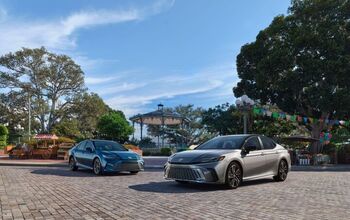Dr. Z Expects a Decade of Disappointment For Fuel Cell Technology
At a round-table discussion with reporters during last week’s Detroit Auto Show, Daimler CEO Dieter Zetsche proclaimed that any consumer wanting to be green with fuel cells had better be prepared for a decade of disappointment with the technology.
Zetsche said there were cost issues with the process for creating fuel cells — Daimler’s three-way dance with Ford and Nissan to bring a market-ready fuel cell vehicle by 2017 was done to help spread the cost while accelerating development — as well as a lack of vehicle volume to help further drive down costs, while the few hydrogen fueling stations around the globe aren’t doing anything to help widespread adoption; there are only 10 such stations in the United States alone, eight of which are in Southern California.
Zetsche is more optimistic on the autonomous vehicle front, however, noting the unexpectedly rapid development in the technology. Mercedes-Benz has taken the lead in the space with the new S-Class and its Distronic cruise control system with automatic braking, which can pilot a car on its own for up to 60 miles with a few adjustments to its onboard technology.
Seattle-based writer, blogger, and photographer for many a publication. Born in Louisville. Raised in Kansas. Where I lay my head is home.
More by Cameron Aubernon


































Comments
Join the conversation
Clean efficient, plentiful hydrogen - brought to you by Shell, Exxon-Mobil, etc. etc. Don't tell the dirty secret, a lot of commercial H2 comes from cracking it out of natural gas.
Hydrogen isn't a fuel source; it's an energy storage medium, like a battery. It takes a lot of energy to generate, compress and even merely STORE hydrogen, and it's not very energy dense (i.e. it requires a big tank). It has about 40% of the well-to-wheel efficiency of battery powered cars. The only advntages over batteries are that it simpler to make longer range and quicker to refill, but those advantages are quickly eroding. The only potential application I see is as a jet fuel once fossil fuels become too expensive. It burn well in jet engines with relatively minor modifications, it only needs to be stored onboard for hours rather than days or weeks, and most of that time is spent in the cold at high altitude. The main disadvantage for aircraft use is the fuel tanks much be MUCH bigger for a given range.
Doubting hydrogen? Youtube search "Bob Lazar hydrogen car" Guy powered a vette with his own homemade hydrogen..in the 80's.
This comment applies equally to the Shell story. Hydrogen is not a fuel in the sense of fuel being a source of energy, and neither is electricity. They are storage mediums (media?). The energy to produce them has to come from a genuine fuel/energy source such as fossil fuel (petrol, natural gas, shale oil etc) or nuclear fusion, solar and so on.Thinking about hydrogen as an energy storage method helps to understand why it will never be useful for a huge fleet of vehicles that need massive route flexibility. It may make sense for a small number of vehicles with fixed routes e.g. ships and school buses.